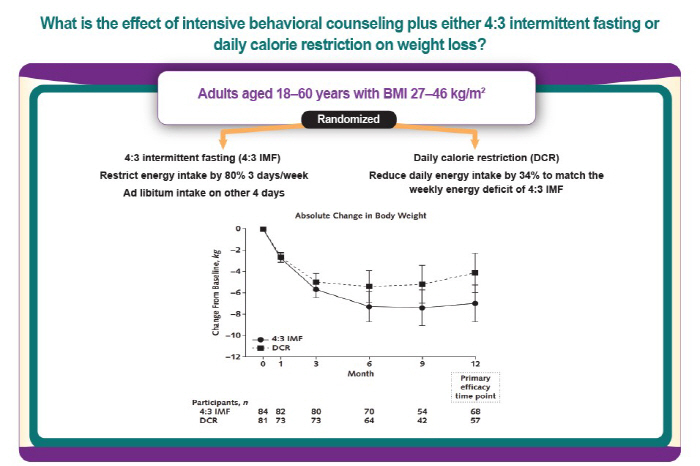Intermittent fasting three days a week has weight loss effects rather than daily calorie intake ↑
Apr 01, 2025
|
This is the result of a study by Dr. Daniel Ostendorf of the University of Colorado, USA, published in the Annals of Internal Medicine on the 1st. The research team said a one-year randomized clinical trial of 165 overweight or obese adults found that 4:3 intermittent fasting had a greater weight loss effect than daily calorie restriction.
In this study, 165 overweight or obese adults with a body mass index of 27 to 46 kg/㎡ were randomly divided into a 4:3 intermittent fasting group (84) and a daily calorie-restricted group (81) and compared their weight loss effects over 12 months.
The 4:3 intermittent fasting group was allowed to limit daily caloric intake by 80% nonconsecutive 3 days per week and to eat food without restriction for the remaining 4 days. The daily caloric restriction group reduced daily energy intake by 35%, equating weekly caloric intake to the 4:3 intermittent fasting group. In addition, both groups participated in a high-intensity comprehensive behavioral weight loss program that encouraged group-based behavioral support and moderate-intensity physical activity to be increased to more than 300 minutes per week. Calorific calculation methods and guidelines for target nutrient ratio (55% carbohydrate, 15% protein, 30% fat) were also provided.
Effectiveness analysis after 1 year showed that the 4:3 intermittent fasting group had an average weight reduction of 7.6% while the daily calorie-restricted group had an average weight reduction of 5%.
In addition, the proportion of people who lost more than 5% of their weight on average was 58% in the 4:3 intermittent fasting group, but only 47% of the daily calorie-restricted group lost more than 5% of their weight. In addition, the intermittent fasting group had more improved cardiovascular metabolic health indicators, including systolic blood pressure and total cholesterol, low density lipoprotein (LDL) cholesterol, and fasting blood sugar levels.
The research team said "Intermittent fasting, which can increase persistence by calculating calories every day by reducing the burden of limiting food intake, can be considered as an evidence-based weight loss diet strategy."
A comprehensive analysis of existing studies related to intermittent fasting published in January by a research team at the University of Mississippi in the `International Journal of Obesity' also concluded that intermittent fasting may be more helpful in lowering fat mass and body fat percentage than diets that do not limit meal time.
This article was translated by Naver AI translator.














